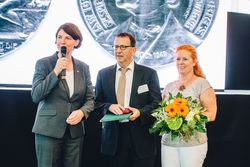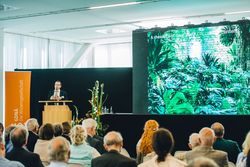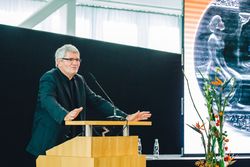Liebig Medal for Markus Antonietti
September 12, 2016
Honoring of Antonietti’s groundbreaking work in the converging fields of polymer research and nanoscience
UniCat Professor Markus Antonietti of the Max Planck Institute of Colloids and Interfaces today received the Liebig Medal from the Gesellschaft Deutscher Chemiker (GDCh - German Chemical Society) in Greifswald in honor of his work.
The GDCh is honoring Antonietti’s groundbreaking work in the converging fields of polymer research and nanoscience. The exceptionally creative researcher has explored new areas of application in chemical energy storage and in sustainable chemistry. Furthermore, his work has influenced several other scientific and technical disciplines.
Antonietti, born in 1960 in Mainz, studied chemistry in his home town and began his career as polymer scientist with a focus on physical chemistry. During his habilitation on microgels with a special structure, he was the first ever also delve into nanogels. During the late 1980s, and thus about 20 years before research on nanoparticles became an established field, he recognized the special characteristics of polymer nanomaterials.
One of Antonietti’s trademarks is that he continuously re-orientates the focus of his research. He thus very successfully researches the self-organization of block copolymers, polyelectrolytes, and amphiphilic polymers.
In 1993 he became the youngest Director of the Max Planck Society. Scientifically, he focused on the crystal growth of polymers, of biomimetic mineralization, and mesocrystalline structures and included inorganic nanomaterials in his research, for which he used polymer ionic liquids as reaction medium.
About ten years ago, his interest began to focus on carbon – ranging from carbon nanostructures all the way to “hydrothermal carbonization”, the artificial production of coal or precursors of crude oil from biomass, one of Antonietti’s contributions to chemical energy storage, which he complemented with work on additional sources of energy.
His contributions to artificial photosynthesis and to the chemical use of carbon dioxide in general are remarkable. Antonietti’s work has been recognized repeatedly by, among others, the bestowal of two honorary doctorates and three honorary professorships. Antonietti is one of the founders of the Cluster of Excellence UniCat. He researches in the Research Field D3.
The laudation on the new recipient of the Liebig Medal was held by Professor Robert Schlögl, Director of the Fritz Haber Institute of the Max Planck Society Berlin, and of the Max Planck Institute for Chemical Energy Conversion Mühlheim/Ruhr.
The honor took place as part of the 129th Meeting of the Gesellschaft Deutscher Naturforscher und Ärzte (GDNÄ - Society of German Natural Scientists and Doctors), in which the GDCh traditionally participates with a scientific meeting and a subsequent official function.
With more than 31,000 members, the German Chemical Society is one of the largest societies in chemical science worldwide. It has been awarding the Liebig Medal since 1903. Numerous of the 67 laureates thus far went on to receive the Nobel Prize: Adolf von Baeyer, Paul Ehrlich, Fritz Haber, Carl Bosch, Max Planck, Friedrich Bergius, Hans Fischer, Feodor Lynen, Karl Ziegler, and Gerhard Ertl.



